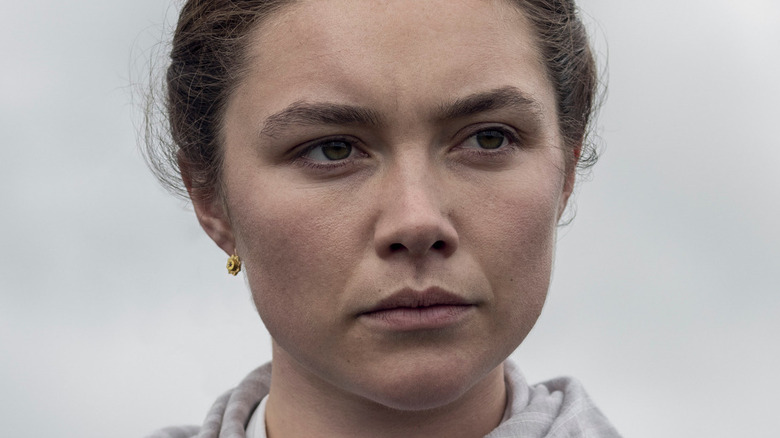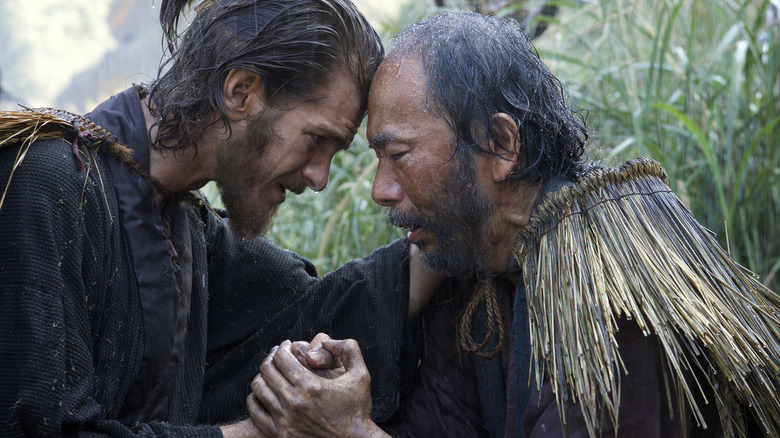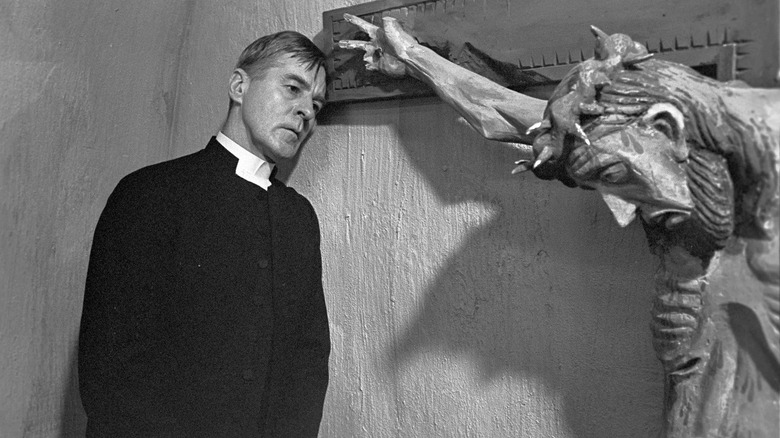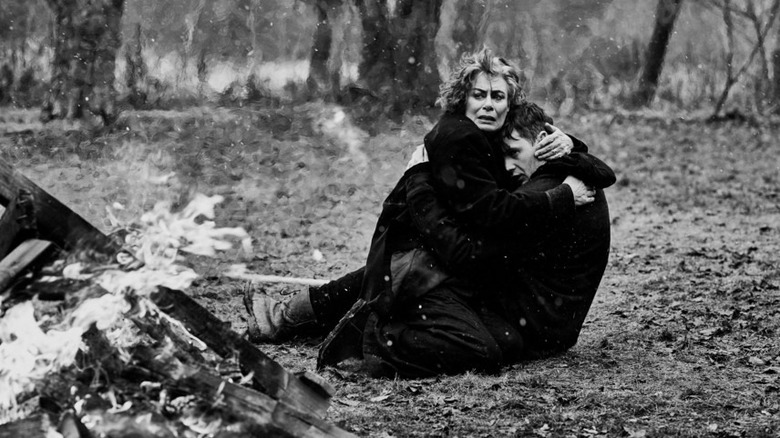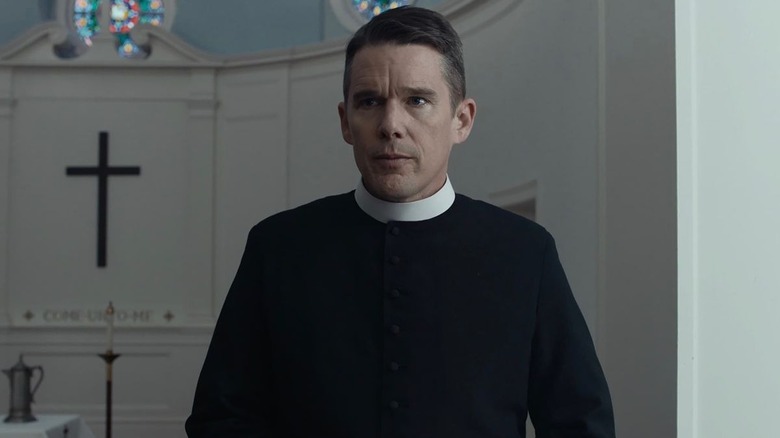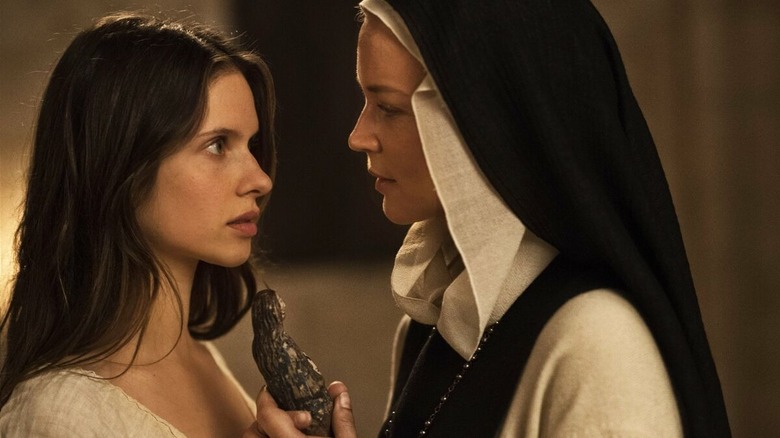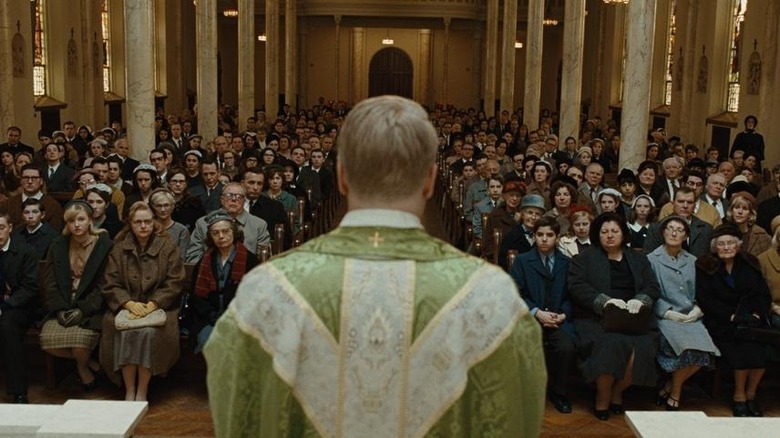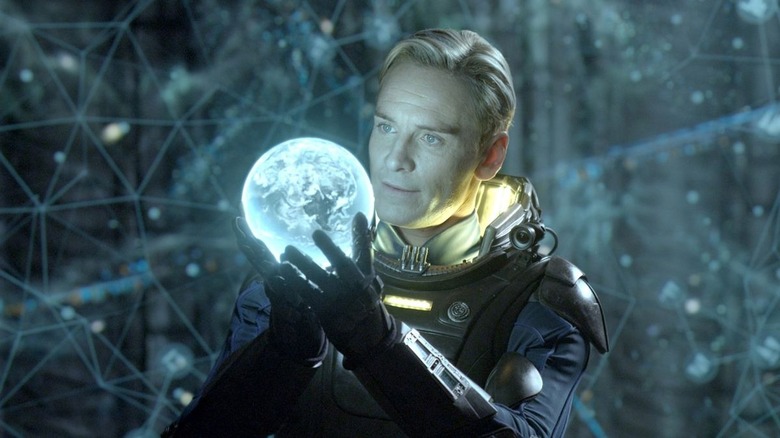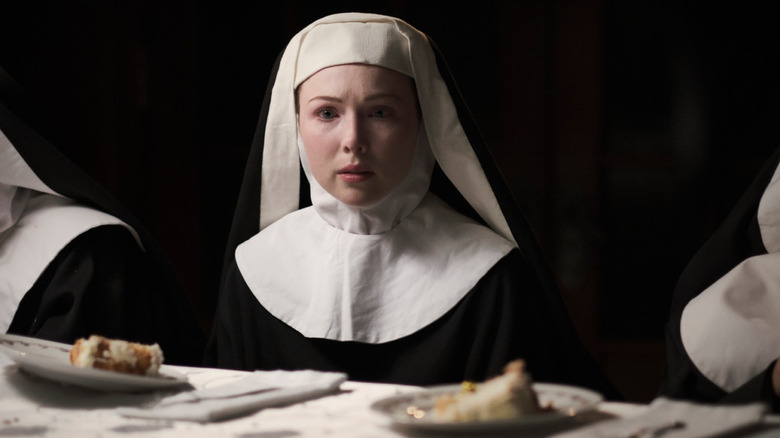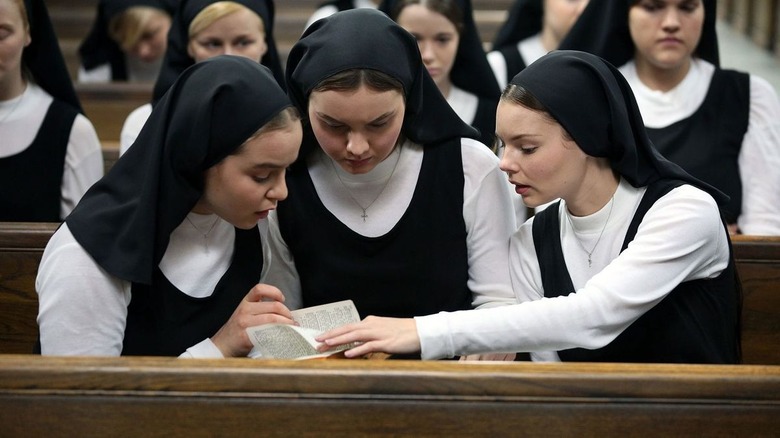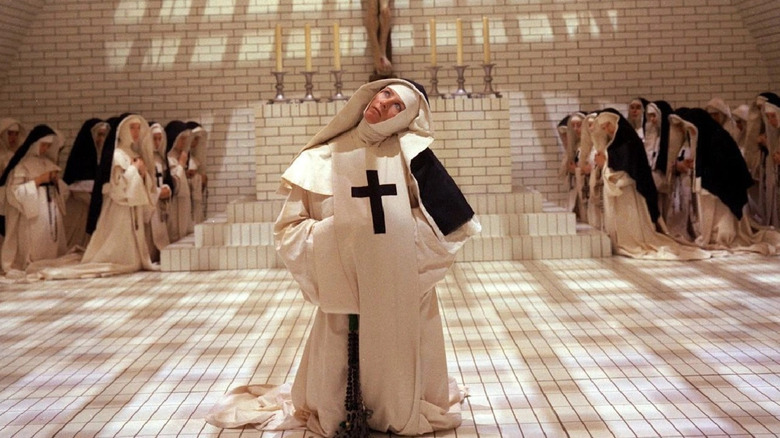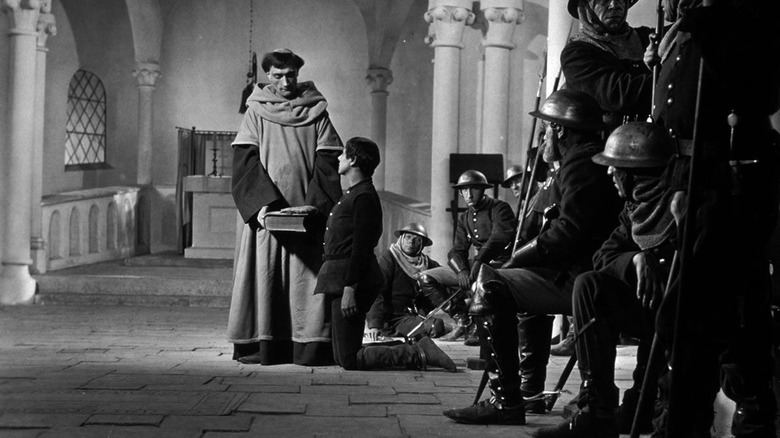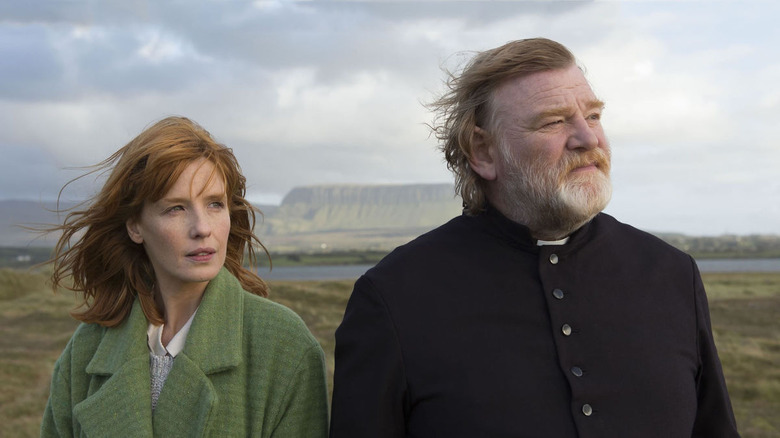12 Best Movies Like Netflix's The Wonder To Watch Next
"The Wonder," based on the novel of the same name by "Room" author Emma Donaghue, tells the story of an English nurse who is called to a rural village in Ireland to observe an 11-year-old girl who has allegedly not eaten for four months. The nurse has been hired by a small committee of prominent townspeople who are determined to find out whether the girl's ability to survive without food is a miracle or a hoax. Joining the nurse in her task is a nun, allowing the committee to say that they have hired both a religious expert and a scientific one to come to an unbiased conclusion.
The movie, which stars Florence Pugh as Elizabeth "Lib" Wright and Kíla Lord Cassidy as the fasting Anna, explores themes of faith, despair, human cruelty, and the power of stories. It's a movie that's remarkable not only for its themes, but for the fantastic performances from the cast and the beautiful cinematography that makes every image in the film look like a gorgeous painting by a Dutch master.
It's a movie that stirs up a lot of questions, which may leave you wanting more movies that help you grapple with these big ideas. We've put together a list of films that explore similar topics, from various angles, and offer a few different genre flavors as well.
Silence
Martin Scorsese is known for his mobster movies, but he's also made some of the best films about religion in the last fifty years. Along with "The Last Temptation of Christ" and "Kundun," "Silence" stands in Scorsese's filmography as a powerful film about the difficulties and rewards of faith, especially in an often hostile environment.
The film, based on the novel of the same name by Shusaku Endo, follows two Portuguese priests who are sent to Japan in the 1600s to find their mentor, who has reportedly denounced his faith. During this period the Japanese Shogunate had rejected Christianity, and Christians in the country were tortured into committing apostasy. The priests do not receive a warm welcome and instead are faced with incredible cruelty, not only for themselves but also for the Japanese Christians they meet along the way. That cruelty forces them to reckon with Christianity and their mission to spread that faith.
Fans of "The Wonder" will certainly appreciate this story of faith in the face of horror. But what makes it especially interesting is the fact that, like "The Wonder," this is a story about colonizers. In "Silence," the priests are missionaries who seek to teach the Japanese people about their religion in an attempt to "save" them, while in "The Wonder," Lib is a visitor from a colonial power who intends to disabuse the O'Donnell family of their religious understanding of Anna's fast.
Winter Light
Swedish writer and director Ingmar Bergman made a lot of movies about faith during his long career, each grappling with the difficulties of holding onto the idea of a benevolent and caring God in the face of an increasingly brutal world. Of all of these films, "Winter Light" is perhaps the best of these, and the one that's most interesting to fans of "The Wonder."
Like "The Wonder," "Winter Light" operates on a small scale, centering around Pastor Tomas (Gunnar Björnstrand) and some of the members of his congregation in a little Swedish town. The film doesn't have much of an overarching narrative, but instead follows Tomas as he has conversations about hope and despair, belief in God, and the importance of Jesus's physical suffering in contrast to the horror of God's silence. Insofar as there is a narrative, it is kicked off by a member of Tomas's congregation expressing despair over nuclear proliferation and seeking help from the pastor that he struggles to offer.
"Winter Light" is a film that, much like "The Wonder," is full of thought-provoking and emotionally potent conversations about faith in a small and intimate context, allowing the grandeur of the ideas and feelings to take center stage.
The Righteous
"The Righteous" is clearly a passion project for writer/director/star Mark O'Brien, and we're grateful that he was able to make such a fascinating movie. The film focuses on elderly ex-priest Frederic (Henry Czerny) and his wife Ethel (Mimi Kuzyk), who are both recovering from the recent loss of their young daughter, and what happens when a mysterious young man named Aaron (O'Brien) shows up on their doorstep asking for help. The couple invites him to stay with them and recover from his injuries.
But soon, Aaron begins to act strangely and somewhat threateningly when alone with Frederic. He tells his morose and guilt-ridden host that Aaron's appearance is Frederic's penance, and that Frederic must kill him or he will begin to harm other people in the community. "The Righteous" is a movie that lands somewhere between a horror movie and an austere drama about God's punishment, leading to something unique and unnervingly beguiling.
Fans of "The Wonder" will undoubtedly appreciate the questions about faith and penance that "The Righteous" features. The beautiful black and white cinematography also makes it a lovely aesthetic experience similar to the painterly images in "The Wonder." While "The Wonder" never moves into outright horror, there are some moments that might lead fans to want something willing to delve into darker territory, and "The Righteous" obliges.
First Reformed
"First Reformed" is heavily inspired by Bergman's "Winter Light," similarly following a pastor who is faced with a young man's existential despair. The difference is that in "First Reformed," that despair arises from the current climate crisis. As the film goes on, pastor Ernst Toller (Ethan Hawke) begins to learn more about these environmental issues, and how the major donor to the renovation of his small church (which is overseen by a nearby megachurch) is a corporation that carries significant responsibility for the crisis.
This information pushes Toller to anger and while he does not seem to ever lose his faith in God, he loses faith in humanity instead. The one person keeping him from going off the deep end is the pregnant wife of the young man who introduced this seemingly reasonable despair into Toller's life. Mary (Amanda Seyfried) develops a friendship with Toller that becomes his lifeline, and as the movie goes on, we see him attempt to balance the grace he finds in their friendship with the horror of the ongoing climate crisis.
"First Reformed" is another film like "The Wonder" that centers on the constant battle between hope and despair in the context of faith, but while "The Wonder" chooses an answer, "First Reformed" is incredibly ambiguous. Paul Schrader very purposefully created a film that would leave audiences unsure of what had happened, and whether hope or despair had triumphed (via Slate).
Benedetta
Paul Verhoeven has made some of the most iconic sci-fi action movies of the 20th century, from the dystopian future of "Robocop" to the interplanetary war of "Starship Troopers." Verhoeven brought the future to life in exciting and thought-provoking ways. But with "Benedetta," he took a look at the past and delivered a movie that fits in perfectly with his filmography, despite being unlike anything he had made before.
"Benedetta," based on the non-fiction book "Immodest Acts: The Life of a Lesbian Nun in Renaissance Italy" by Judith C. Brown, revolves around Benedetta (Virginie Efira), who is brought to a convent to become a nun at a young age. As a young woman, she begins to have ecstatic visions and (as the title of the book suggests) has an affair with one of her fellow nuns. When Benedetta first tells the other sisters in the convent that she has had a vision, some believe her and others do not, creating a narrative that sets doubt and faith against one another in a very similar way to "The Wonder."
Like "The Wonder," "Benedetta" also primarily focuses on the relationships, both supportive and destructive, between women within this context. "Benedetta" also centers on stories in a way that fans of "The Wonder" will find rewarding, as we see different nuns use the stories they tell about each other and themselves to consolidate power within their walls.
Doubt
"Doubt," based on the play "Doubt, A Parable" by John Patrick Shanley, is the only movie on this list that explicitly focuses on children in a way that's similar to "The Wonder." Here, the child at the center of the film is a young boy who is the only Black student at a Catholic elementary school in 1960s New York, and might be the victim of sexual abuse from the school's priest.
Unlike "The Wonder," the questions that arise around a child in "Doubt" are not questions of a potential miracle but instead questions that shake the faith of one of the young nuns, who believes that her head priest could be assaulting his students. Both "The Wonder" and "Doubt" center on questions about the treatment of children in a religious context, but what really links "Doubt" with "The Wonder" is the way it focuses on the powerlessness of women who witness this abuse and fight to bring it into the light.
In "The Wonder," Lib struggles with how she can save Anna, and in "Doubt," some of the nuns feel like they cannot help the young boy. That inability to make a difference then leads them to wrestle with their faith and what it means to believe in a benevolent God who allows such horror.
If you or anyone you know has been a victim of sexual assault, help is available. Visit the Rape, Abuse & Incest National Network website or contact RAINN's National Helpline at 1-800-656-HOPE (4673).
Prometheus
It may be strange to see a sci-fi horror movie on a list of movies similar to a period piece about faith, but we think that fans of "The Wonder" will find a lot to appreciate about "Prometheus." The film, which serves as a prequel to the "Alien" franchise, tells the story of a group of scientists and explorers who discover a map of the stars that they believe may lead them to humanity's creators.
Like "The Wonder," "Prometheus" is primarily a movie about faith and doubt, hope and despair. There are those on the Prometheus mission who believe that they may find mankind's creators, and will have the opportunity to ask them profound philosophical questions. Others on the ship think that the exploration is a fool's errand and that these are questions whose answers are unknowable. It's also similar to "The Wonder," in that "Prometheus" dances around the stories we tell ourselves about the world and how we make sense of it. And among all of those big ideas, "Prometheus" also offers some of the most viscerally thrilling and disturbing science fiction and body horror sequences of the 21st century.
Agnes
"Agnes" is a movie that uses possession and exorcism as a jumping-off point. The film's first half features a convent where a nun seems to have become possessed, and details the events that follow when priests are brought in to perform an exorcism. But in its second half, it considers the way that experience impacts the life of one of the nuns who saw it all happen, and lost a friend in the process.
"Agnes" does not, in fact, center around Agnes (Hayley McFarland), the girl who may or may not be possessed, but instead on Mary (Molly Quinn). She is one of Agnes's closest friends in the convent, and Agnes's exorcism has a lasting effect on her. It's a strange movie that deftly shifts between horror, comedy, and drama, but always remains emotionally true and never wavers from its central questions about how faith and grief intertwine.
It's an especially interesting movie for fans of "The Wonder," because unlike "The Wonder," where grief twists a family's faith into something cruel so that they can continue to tell themselves religious stories because they are comforting, "Agnes" demonstrates how grief can push people away from their faith.
Novitiate
"Novitiate" is another film that centers around nuns, this time in the early 1960s, just as the reforms of the Second Vatican Council began to be implemented. The film follows Cathleen (Margaret Qualley), a girl raised by a loving single mother who finds God during her time at Catholic school and decides that she wants to become a nun.
Unlike many movies about women who become nuns, Cathleen's mother Nora (Julianne Nicholson) doesn't understand her daughter's desire to join the convent, especially the incredibly strict and cloistered order that Cathleen has selected. This conflict is just one of the many explored in "Novitiate," as the film uses Cathleen's story as a jumping-off point for glimpses into the lives, hearts, and minds of other nuns in the convent.
Among them are Mary Grace (Dianna Agron), who begins to fear that she made a mistake by choosing to become a nun when she was so young, the Reverend Mother (Melissa Leo), who struggles with the impending reforms, and Emmanuel (Rebecca Dayan), who recently transferred from another order because she believes she requires a stricter atmosphere.
"Novitiate" is a movie that explores different women's relationships with faith and the ways in which those varying dynamics can affect one another. It's a beautiful film that's equally full of hope and horror within the small world of the convent.
The Devils
"The Devils," based on the non-fiction novel "The Devils of Loudun" by Aldous Huxley, is one of the most infamous and controversial movies ever made, but it also has roots in a true story. The film takes place in a convent in the French town of Loudun, where several nuns were ostensibly possessed after being bewitched by a popular priest.
The film is multifaceted and engages a variety of topics around faith, sexual repression, and the way the Catholic Church exhibited its power over even its most fervent adherents during the 17th century. The primary tension of the film is the relationship between the Church and the sexual repression of the nuns in the convent, particularly Sister Jeanne (Vanessa Redgrave), who finds herself obsessed with the priest Urbain Grandier (Oliver Reed).
"The Devils," like "The Wonder," is interested in the ways that women make sense of their faith, especially when they are given reason to doubt. And while in "The Devils," religious power is exerted over an entire convent, and in "The Wonder" it's over a child, they are both movies about the way that faith can be used to manipulate people.
The Passion of Joan of Arc
One of the most important movies of all time, "The Passion of Joan of Arc" isn't just a great film about faith and a young woman's adherence to it. It's also a movie that influenced the development of cinema, featuring extreme close-ups and innovative production design. The film tells the story of the trial of the young Joan of Arc (Renée Jeanne Falconetti) after she has been captured by the English. In theory, Joan's trial is meant to discern whether the young girl committed heresy by stating that she had spoken to God, but the clergymen who interrogate her have no interest in the truth: They are only interested in a confession.
It's a fascinating movie to look at in relation to "The Wonder," because both movies are fundamentally about discovering whether a girl has truly experienced something miraculous or has lied to those around her. Only in this case, it is the members of the Church who think the girl is lying. The men who interrogate and torture Joan are all clergymen who believe that she has not experienced a miracle and is in fact an egotistical charlatan. But Joan's faith never wavers, operating at the center of a beautiful but undeniably difficult film about faith and devotion.
Calvary
"Calvary" starts with a shock, as Father James (Brendan Gleeson) is told by an unseen parishioner in a confessional that he will kill Father James in a week, because of the abuse he suffered as a boy at the hands of a different priest. The man thinks that the death of a good priest like Father James will hurt the church more than the death of a bad priest like his abuser ever could.
It's a shocking setup, especially as the man gives details about his assault, but "Calvary" is actually a comedy — a very dark comedy, but a comedy nonetheless. The film follows Father James as he makes his way around his town meeting with members of his congregation and doing his best to help them in whatever final ways he can before he greets death, while also spending time with his daughter (from before he joined the priesthood). It's a beautiful and often very funny movie that seriously engages with questions of sin, penance, and suicidality in the face of a seemingly uncaring God.
"Calvary" is also an interesting film to pair with "The Wonder" as it shows a very different response to sexual abuse than the one explored in "The Wonder," a response that seeks retribution instead of grace, though both may be misguided.
If you or anyone you know is having suicidal thoughts, please call the National Suicide Prevention Lifeline by dialing 988 or by calling 1-800-273-TALK (8255).
If you or anyone you know has been a victim of sexual assault, help is available. Visit the Rape, Abuse & Incest National Network website or contact RAINN's National Helpline at 1-800-656-HOPE (4673).
